And what it all boils down to, my friend, is that everything is just fine…fine…fine… ‘cause I got one hand in my pocket and the other one’s holding a Hippodrome Ticket! The iconic album that framed so many of my generation’s youth, Alanis Morissette’s ‘Jagged Little Pill’ is now a major stage musical. Jagged Little Pill, an odd but not unwelcome choice for the Christmas season, is now appearing at Baltimore’s Hippodrome Theatre for a one-week, eight-performance engagement. Directed by Diane Paulus, with Musical Supervision by Tom Kitt, and Choreography Sidi Larbi Cherkaoui, this fury-fueled musical brings a lot of emotions to the forefront, tackling what is arguably one too many issues of the 90’s, which are unfortunately still horribly relevant today.
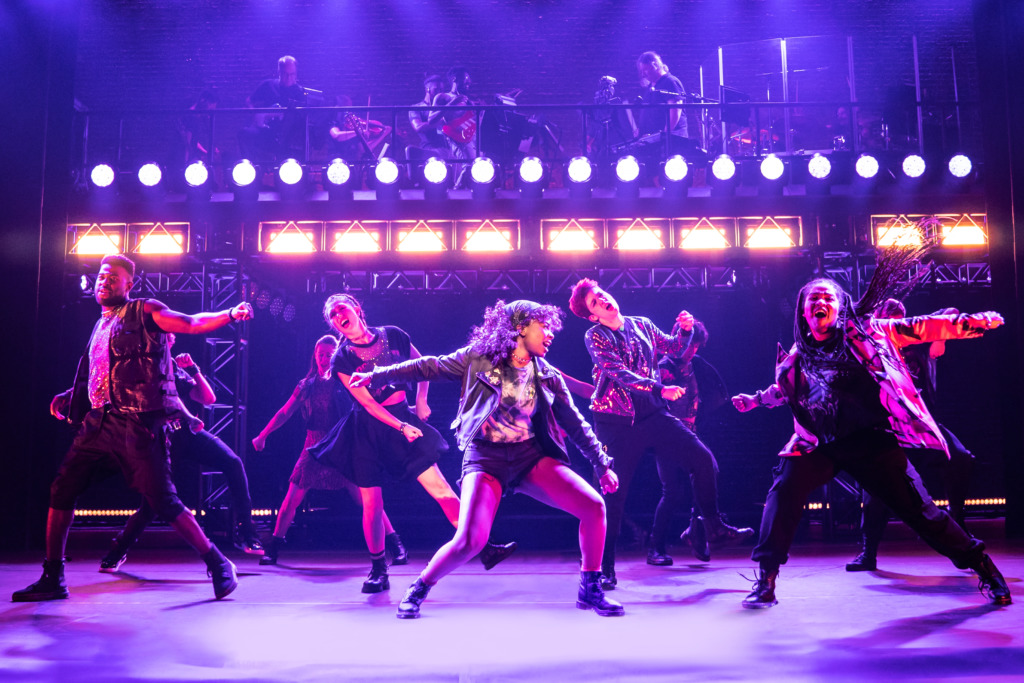
With Alanis Morissette’s iconic music and lyrics (and additional music by Glen Ballard) one would think the production must be flawless. But librettist Diablo Cody has generated several problems in the issues-heavy plot that he’s set forth for the story. Focusing on the Healy Family, an upper-class white family with ‘the perfect mom’, MJ, the overworked father, Steve, the winner-champion prodigal son, Nick, and the adopted black daughter, Frankie, the show spirals out and attempts to split its focus in half a dozen directions all at once. That’s not to say that Cody’s book doesn’t do its damnedest to reign in the focus to two of the more centralized issues— ‘perfect mom with traumatic incident in her past becoming a prescription/opioid drug addict’ and ‘why do we only believe a young woman when she tells her date-rape narrative after a cis-gendered white male confesses that he witnessed it?’— but the peripheral clouding of all these other issues makes what’s happening on stage a lot of the audience to absorb and accept. That’s not to say that opioid addiction and rape occur in vacuums and are excluded from any other type of stress or social issue, but Cody’s book has every character that’s introduced bringing a separate, large-scale issue to the table (Jo with her lesbian identity not being accepted by her overly religious mother, Phoenix whose Dad isn’t in the picture so he has to support his medically dependent sister and help care for his mother, etc.) The show could have been conceptually cleaner if the age-old concept of ‘less is more’ was applied to the book.
There’s also a lot of superfluity happening in the show in regard to the dancing and movement. While it is amazing and impressive— and it should be noted that this critique is not over the steller and sensational capability of the dancers on the stage because they are stunning and astonishing to watch— to see these disjointed body-impossible style movements all throughout the performance, they feel over-utilized and unnecessary. There seems to be this vague notion of emotional combustion that both Director Diane Paulus and Choreographer Sidi Larbi Cherkaoui are pushing onto the overall dance vibe of the show; there are moments when the characters are scream-belting through more emotionally intense songs and this is when the high-octane— and again, visually shocking and astonishing— intense choreography comes into play with nameless dancers from the ensemble rocketing their way around the stage. It’s like these moments are meant to represent a pathos overload and that because the character’s can’t fully express whatever it is they are feeling in that moment, Cherkaoui and Paulus have given them this emotional extension with chaotic, hardcore dancing all around them. It’s wild, but in most places feels overdone and largely unnecessary.
Jagged Little Pill is packed full of moments like that. While it is absolutely fascinating to watch the company move in semi-slow motion and completely backwards all through “Smiling” you’re left wondering ‘was that a necessary choice? Or did we just do that because it looked neat?’ There are, however, moments where Cherkaoui’s use of this heightened intensity movement and dance are really impactful. “Uninvited”, which physically showcases the polarizing battle Mary Jane has with herself while on a bad drug overdose, features a body-double (Jena VanEslander) that becomes some sort of liquified human slipping, struggling and cascading all over the couch. This visual device is striking and is an excellent use of Cherkaoui’s skill set in regards to intense choreography. To Cherkaoui’s credit, the overall post-grunge, angry-voice, verve of the music is well-encapsulated in the chorographic routines used during the show, and the dancing ensemble executes them with flawless precision; they’re just often overused.
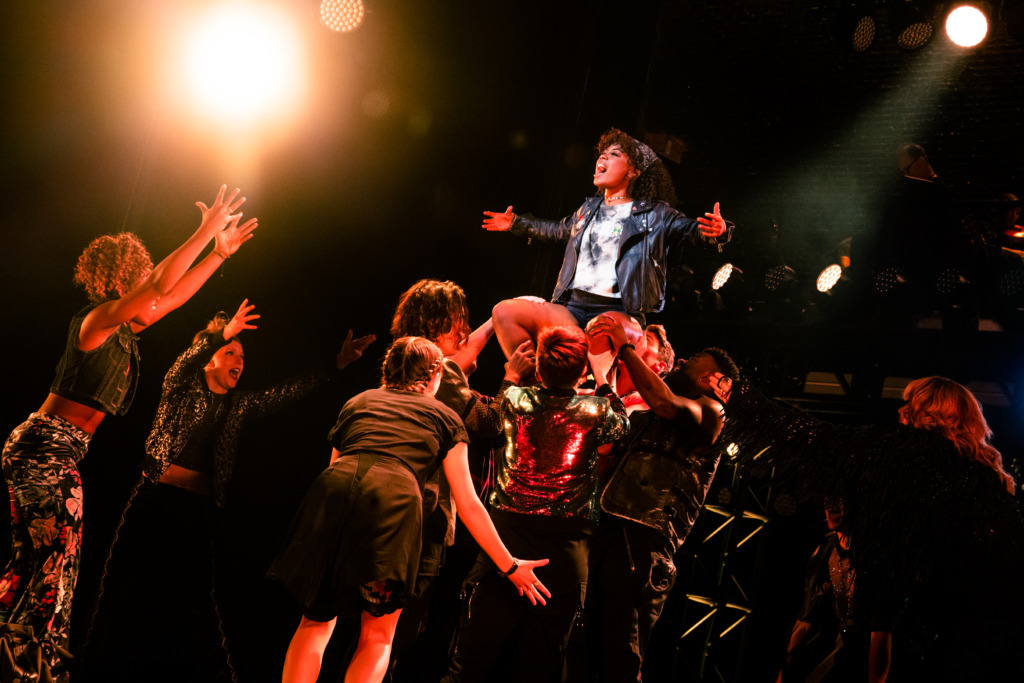
Lighting Designer Justin Townsend captures the emotional essence of the show’s music and overly complex labyrinth of plot points well in his design work. There is an awe-inspiring moment when Jo shows up in New York City just at the top of “You Oughta Know” where a low floor-flood of red creeps in at the back wall of the stage and seeps its way up the walls until the fury, angry blood-red of a woman scorned floods the entire stage, enveloping Jo and the ensemble in this bath of raging, negative emotions by way of intense crimson and ruby illumination. This is the most spectacular moment of theatrical lighting in the entire production and it sends chills up the spine. Though a close second, in a far different vein, is when Frankie and Phoenix are climbing all over the swing-set, as its spun around and around, and the focal spotlights on the characters cast shadows back on the wall making the characters look like two little children playing on a playground; it’s a fascinating image that duels directly with the physical presence of two teenagers trying to navigate liking one another.
It’s difficult to dissect the production values of the show overall because for every one amazing thing there are three or four other things that are either out of place, feel like they don’t belong, or just seem ‘a bit too much’, for lack of better phrasing. Most of the set is moving pieces, which are transitioned in and out flawlessly in time with the sharp and rapid pacing of the show. Scenic Designer Riccardo Hernández works with Video Designer Lucy MacKinnon to create some eye-popping visuals at various points throughout the show— some wildly impressive and really grabbing the attention of the audience, others falling in line with the much-needed application of ‘less is more’ when it comes to this production. Hernández situates the live orchestra (spearheaded by Conductor Matt Doebler) on scaffolding directly above the play space, allowing them to sometimes be seen and sometimes not, which is an interesting and sometimes satisfying choice for this show.
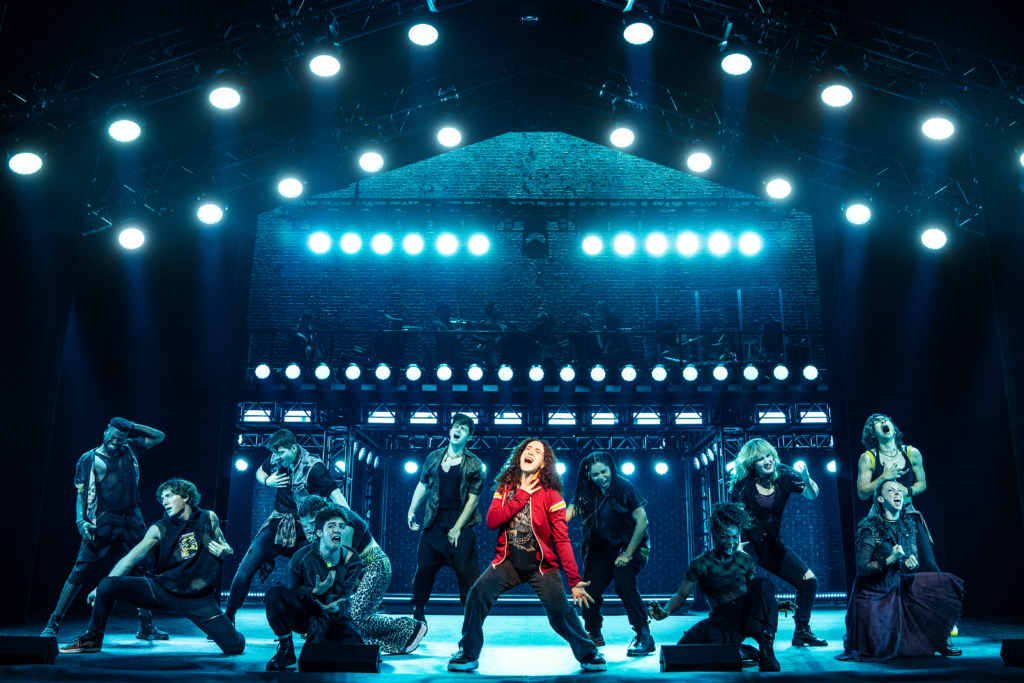
The ensemble (Lee H. Alexander, Delaney Brown, Jada Simone Clark, Lani Corson, Jason Goldston, Rishi Golani, Zach Hess, Cydney Kutcipal, Jordan Leigh McCaskill, Alana Pollard, Daniel Thimm, Kei Tsuruharatani, Jena VanElslander) lends an immeasurable amount of talent to the performance, even if it is ill-placed and at times over-utilized. These singing and dancing performers are in possession of extraordinarily powerful voices and superb dance skills and put on one hell of a show, even if the show itself is somewhat of a sensory, subject-matter overload. (No one told Diablo Cody, Alanis Morissette, and Glen Ballard that social issues of both the 90’s and now are not Pokémon; you do not need to catch them all in one show.)
There are bone-chilling moments peppered throughout the production that allow Morissette’s original musical intention to blaze through in raw, painstaking clarity. But there are also moments where what made some of these songs so brilliant— the unfettered undirected anger of being a feminist— is completely lost because the libretto attempts to focus and redirect that sensation and give it purpose, guidance and meaning. Occasionally it works, more often it does not. The show is a mixed bag of things that are powerful, brilliant, and resonant, coupled up with moments that are inexplicably baffling but look really cool, or just seem like too much. Performances across the board are vocally solid, and sometimes even capture the original essence of Morissette’s music.
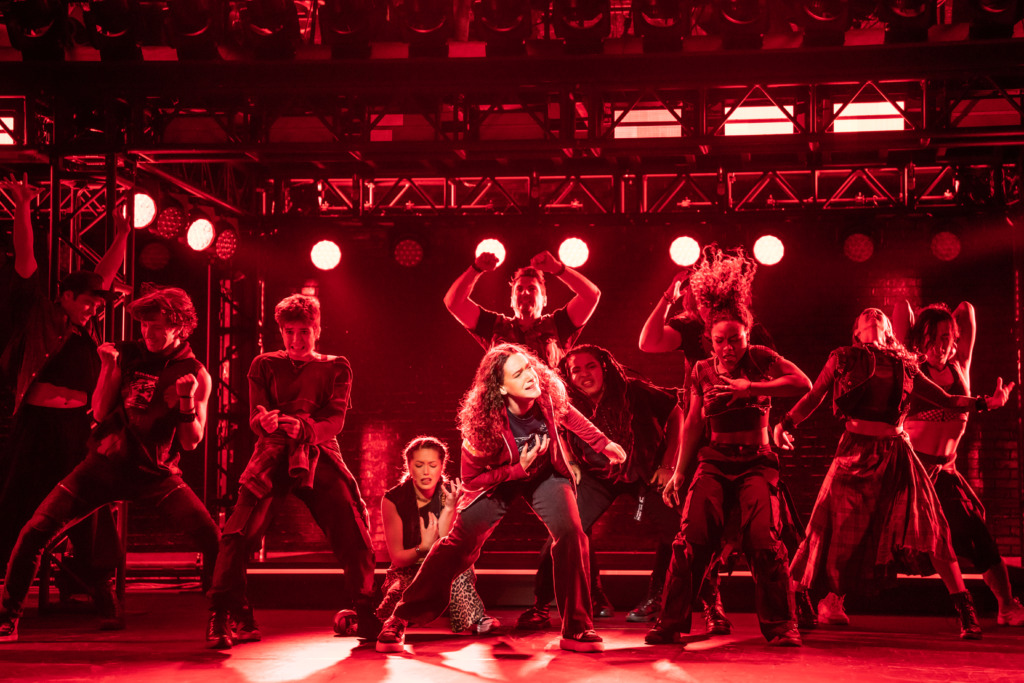
Jo (Jade McLeod) gives two of the most blindsiding performances in the production. McLeod is channeling their inner Alanis, to the point of even sounding a bit like the mesmeric singer, particularly when jumpstarting “Hand In My Pocket.” There is just something about McLeod’s voice that resonates with anyone who grew up listening to the “Jagged Little Pill” album so it’s a resounding victory that McLeod’s character gets to deliver— in earnest solo style— two of the most intense and impactful numbers from the original album. In a scene, fraught with spoilers so the context of the scene won’t be mentioned, where McLeod’s character arrives unannounced, they deliver in eerily beautiful acapella style, “Your House” (the bonus track, hidden deep on the original album’s track 13) and your blood just freezes. The fact that it’s McLeod who gets to lambast every negative feeling of fury, resentment, ‘woman-scorned’ during “You Oughta Know” is one of the most vindicating moments in this show and McLeod does that number such justice your spine will be ringing with tingles for days. Hats off to Jade McLeod and their phenomenal performance in this supporting character role.
Phoenix (Rishi Golani) is introduced in the middle of the second act to create a counter-balance to the Frankie character. Golani has a solid voice that is both playful and warm. You get to hear most of his vocal impressiveness during “That I Would Be Good” and later during the very sweet duet section of “Head Over Feet” that he shares with Frankie. Despite the issues that his character brings to the table, the character itself feels somewhat static and underdeveloped, created solely for the sake of giving Frankie an alternative to express her bisexuality. Frankie (Lauren Chanel) ends up being featured on a great number of songs that feel forced into the plot. “Ironic” which is arguably one of Morissette’s most beloved and well-recognized songs, gets turned into a ‘poem-story’ that the character reads aloud during her English class, with frequent interruptions by ensemble classmates to point out that what she’s singing isn’t actually irony. Chanel has a solid voice, which lends itself to the sweeter bits of some of the songs assigned to her character, but the character itself feels somewhat contrived, with multiple social-agenda issues packed into the character’s existence for the sake of making sure they are represented in the show.
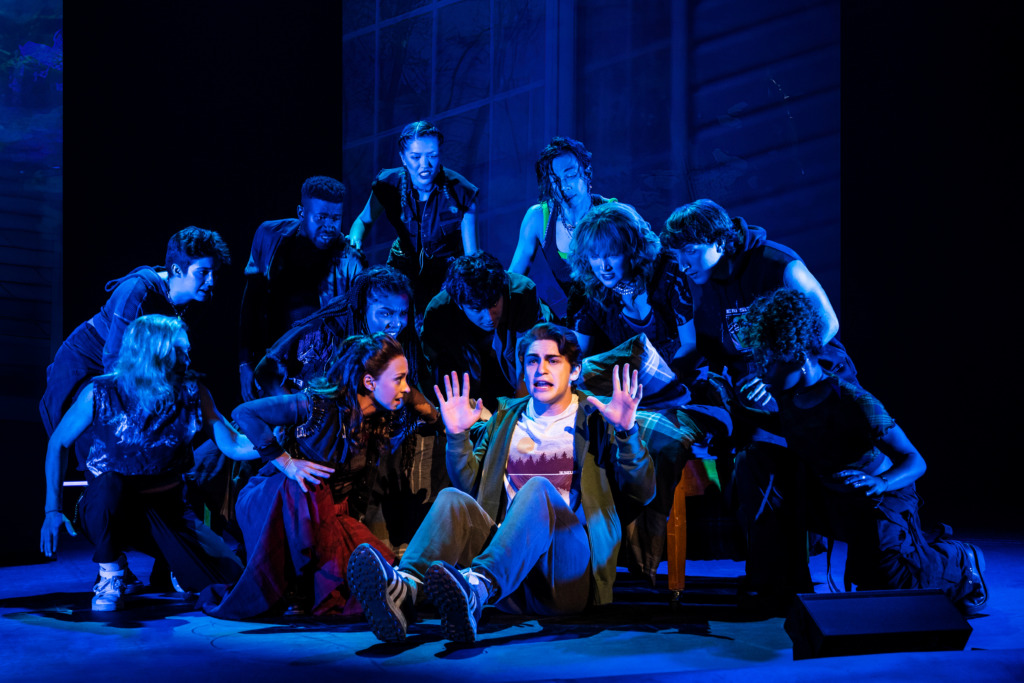
Nick (Dillon Klena) perfectly sums up the expectations of a kid who has been groomed to live his parents’ ideal version of himself. Klena does an extraordinary job of portraying the bottled-up and withheld pressure that the character is experiencing and giving him “Perfect” as a solo number is one of the smartest fits in regards to ‘song catalogue naturally matches the narrative’ in the production. (The Act I finale, “Forgiven” and Jo’s “You Oughta Know” are the other two perfect natural matches, though there are others that feel somewhat natural or at least less contrived than some of the way the musical numbers have been shoehorned into this narrative and vice versa.) Klena’s voice is purely emotional when singing and it just clicks with that number as well as his portions of “Wake Up” and the lines he gets to sing during “All I Really Want.”
Bella (Allison Sheppard) is much like the Jo character in the sense that if more focus had been devoted to their side stories, the show would have been cleaner and even more empowering. Watching Sheppard ride the unrelenting and brutalizing roller coaster experience of being raped at a party while drunk and the cascade of emotional turmoil that she traverses is remarkable. In the scene that Sheppard shares with the Mary Jane character, where Bella is desperate for answers; the performance that she gives in that one moment, as it dawns on her character that things may never be okay again, is so shocking and horrifically heartfelt and honest that she generates enough emotional gravitas to propel the rest of the narrative forward. You get a stellar image, Sheppard lit in ghostly blue between Mary Jane and her body double during “Uninvited” and a chance to hear her vocal prowess.
Steve (Chris Hoch) is the most disposable character of the bunch, which is unfortunate because Hoch’s comic timing is impeccable. There are a great many zingers and one-liners and darkly-shaded humorous moments, particularly in Steve’s interactions with Mary Jane while at the couples’ therapist office, that sting with such a bleak humor and Hoch delivers them with sharp comedic precision. But the character of Steve is given a great deal of ‘forced-fit’ songs. “Not the Doctor”, which has lyrics six-sorts of rearranged to painstakingly fit the situation Steven and MJ (as Mary Jane is often referred to) are in is one such example, and while Hoch sings a beautiful, almost lullaby-esque tune for “Mary Jane”, you see how terribly contrived naming that character is so that when she crashes to rock bottom her husband can sing this song at her. Hoch has a great voice, but his character feels like it was fitted into the jukebox-musical scene because they needed marital dysfunction and certain songs from the album to be included in the production.
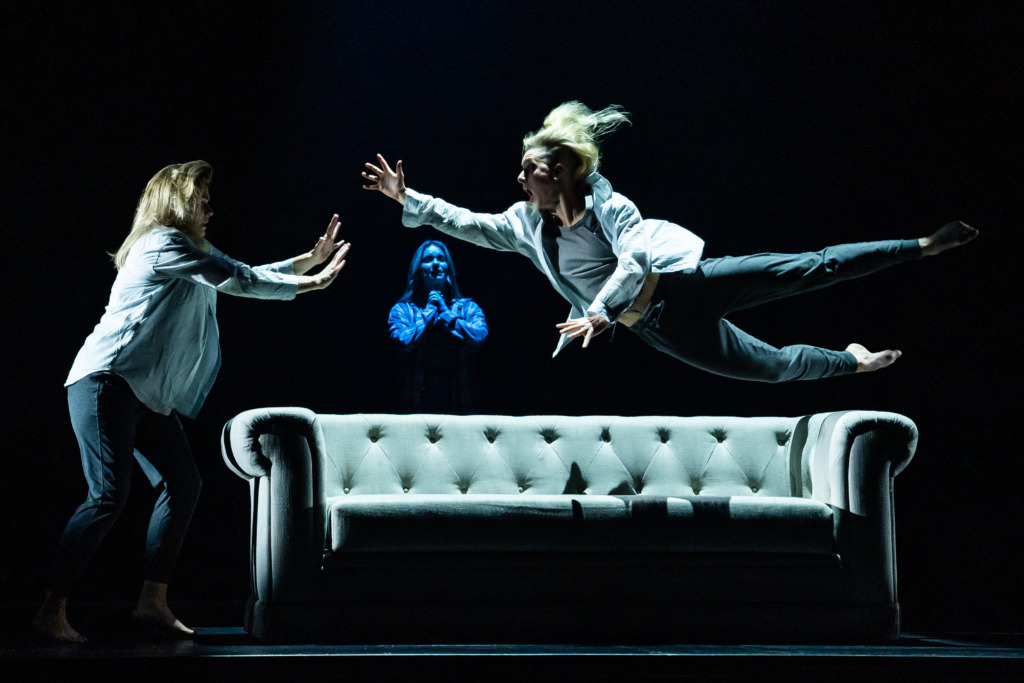
The character of Mary Jane (Heidi Blickenstaff) is, much like the overall production, a mixed-bag. She’s flawed and we appreciate that, because humans are flawed, and in watching her struggles, some of those moments are truly tragically beautiful. But Blickenstaff, despite taking over the role on Broadway and reigniting it for the relaunch of the tour, feels out of sync and out of sorts with the character. There’s some vocal fry going on in her speaking voice, which whether it’s a choice or not, makes a lot of what she says difficult to understand and creates a grating quality for the character that isn’t as quirky and charming as both Blickenstaff and the director think it is. But there are truly astonishing moments— the act one finale where you find Blickenstaff in the church— where she just belts it out of the park. “Forgiven” is such a striking moment in this production and you really get a sense of the ‘rock bottom’ that the character is approaching in the way she explodes throughout this number. Her comic timing is okay; it would seem more impressive if Chris Hoch’s wasn’t so perfect. And while it is understood that this rendering of Alanis Morissette’s music is different from the album, the album is iconic and certain intense belted sustains are expected in certain numbers. Blickenstaff does not deliver these, and whether they’re cut out for the sake of the musical or because she can’t sustain them is unclear, but nevertheless disappointing. She’s a solid performer, she just feels like an odd choice for this character.
The show is worth engaging with, even if it is overly conceptualized, a lot to process, and brings way too many issues with not enough centralized focus to the forefront. There are incredible moments— during “why are you so petrified of silence; here can you handle this?” break of “All I Really Want” where the visual on screen is the direct impact of mass school shootings, or the moment during “No” where all of the righteous protest signs about consent and rape impacting all genders are proudly on display— combined with some extraordinary talent, but it’s a bit of a jumble and comes with an overwhelming intensity that might not be suitable or enjoyable for all audiences. It definitely ticks the box of “discomfort the comfortable and comfort the discomforted”, bringing along with it a great examination of a whole bunch of social issues. It could have been a stronger production if the over-conceptualized narrative had honed its focus on one or two and shoe-horned less character and lyric choices into the experience. Jagged Little Pill is a brilliant disaster with tragically beautiful moments that are unlike anything you’ve ever witnessed, and the show should be seen just so that you can weigh in with an opinion of your own.
Running Time: 2 hours and 45 minutes with one intermission
Jagged Little Pill plays through December 18, 2022 at Baltimore’s Hippodrome Theatre as a part of the Broadway Across America touring series in the France-Merrick Performing Arts Center— 12 N. Eutaw Street in the Bromo Seltzer Arts District of Baltimore, MD. For tickets call the box office at (410) 752-7444 or purchase them purchase them online.
